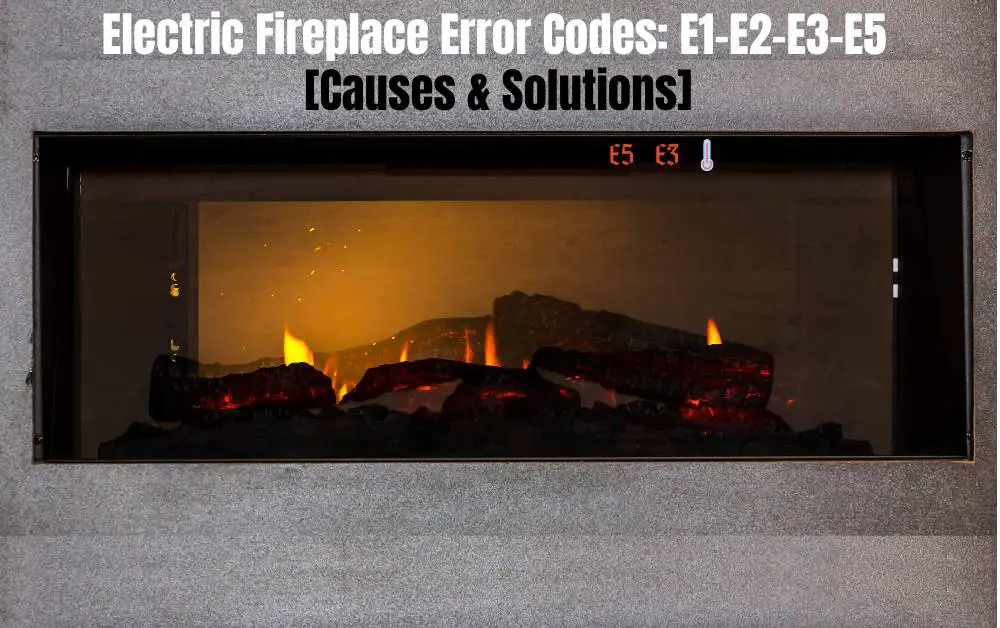Electric fireplaces are a cozy, convenient way to heat your space. However, many users experience an alarming issue: their extension cords becoming dangerously hot. This problem might seem minor at first, but it can lead to severe safety risks if not addressed promptly. Let’s dive into the reasons behind this issue and what you can do to resolve it.
Using an extension cord with an electric fireplace is generally not recommended due to several safety concerns. Electric fireplaces typically consume a significant amount of power, which can exceed the capacity of standard extension cords, leading to overheating and increasing the risk of fire.
Common Electrical Requirements for Electric Fireplaces
Electric fireplaces typically run on 120-volt outlets and draw between 8 to 15 amps, depending on the model. For optimal performance and safety, they should ideally be plugged directly into a wall outlet without the use of an extension cord. If an extension cord is necessary, it must meet specific criteria to handle the load.
Can You Safely Use an Extension Cord with an Electric Fireplace?
While it is technically possible to use an extension cord with an electric fireplace, it is not recommended. Extension cords can create additional resistance and may not be designed to handle the high-power draw of an electric fireplace, leading to overheating.
Types of Extension Cords and Their Suitability
Not all extension cords are created equal. Some are designed for light-duty tasks like powering a lamp, while others are rated for heavy-duty appliances.
For an electric fireplace, only heavy-duty cords with a sufficient gauge (usually 14-gauge or lower) and power rating should be considered. Using a lower-quality cord can result in heat build-up and potential hazards.
Why Is the Electric Fireplace Making the Extension Cord Hot?
Electric fireplaces consume a significant amount of energy. If the extension cord is not rated to handle the fireplace’s wattage, it can overload. This overload increases resistance, which generates heat and causes the cord to become warm or even dangerously hot.
Using an extension cord not designed for heavy loads is one of the primary reasons cords overheat. Thin or poorly insulated cords are especially prone to overheating when powering devices like electric fireplaces.
Loose or improperly fitted connections between the fireplace plug and the extension cord can also create resistance. This resistance increases the flow of heat, putting the cord and surrounding area at risk for damage or fire.
Potential Risks of a Hot Extension Cord
Fire Hazards and Electrical Damage
A hot extension cord is a serious fire hazard. Over time, the heat can melt the cord’s insulation, exposing wires and potentially causing electrical fires. Damaged cords can also lead to sparks and short circuits, further increasing the danger.
Impact on the Fireplace’s Performance
An overheating cord can limit the fireplace’s ability to operate efficiently. The appliance may draw less power than required, leading to reduced heating capability or frequent shutoffs as a safety mechanism.
Warning Signs You Shouldn’t Ignore
If you notice any of the following, it’s time to address the issue immediately:
-
The extension cord feels excessively hot to the touch.
-
There is a burning smell or visible discoloration on the cord.
-
The fireplace’s plug or cord shows signs of melting or scorching.
Solutions to Prevent Overheating
Use a Proper Extension Cord
If you must use an extension cord, choose one specifically designed for high-power appliances. Look for a cord labeled “heavy-duty extension cord” with a gauge rating of 14 or lower (lower numbers indicate thicker wires that can handle more current). A heavy-duty cord will have adequate insulation and capacity to manage the electricity flow, reducing the risk of overheating.
Check the Power Ratings
Always ensure the extension cord’s power rating exceeds the fireplace’s wattage and amperage requirements. For example, if your electric fireplace consumes 1,500 watts and draws 15 amps, the extension cord should support at least that amount or more.
Most product packaging or labels provide this information, so take the time to compare and choose wisely.
Direct Plugging vs. Extension Cord Use
The safest option for your electric fireplace is to avoid using an extension cord entirely. Plugging the unit directly into a wall outlet ensures minimal resistance and lowers the chances of overheating.
If the fireplace’s cord is too short, consider relocating the appliance closer to an outlet or hiring an electrician to install a new one.
Troubleshooting the Problem
Inspecting the Extension Cord
Before using an extension cord, thoroughly inspect it for wear and tear. Look for cracks, exposed wires, or damage to the insulation. If any of these are present, replace the cord immediately.
Additionally, ensure the cord’s prongs and connections are free from dust or debris, as these can impact performance and create resistance.
Evaluating the Fireplace’s Power Needs
Verify your electric fireplace’s power requirements by consulting its user manual or checking the specifications label. Cross-reference this information with the ratings of your extension cord or wall outlet to ensure compatibility.
If the power draw exceeds what your current setup can handle, it’s time to upgrade.
Consulting a Professional Electrician
If you’re unsure about the safety of your electrical setup, it’s always a good idea to consult a licensed electrician. They can assess your home’s wiring, install additional outlets if necessary, and provide expert recommendations for safely using your electric fireplace.
Best Practices for Electric Fireplace Use
-
Never daisy-chain multiple extension cords together. This compounds resistance and greatly increases the risk of overheating.
-
Avoid running extension cords under rugs, furniture, or through tight spaces, as these can trap heat and exacerbate the problem.
-
Do not overload a single outlet with multiple high-power devices, as this can cause a circuit to trip or overheat.
Regular maintenance of your electric fireplace is essential for optimal performance. Clean the unit periodically to prevent dust buildup, especially around the vents and fans. Also, inspect the power cord for signs of wear and replace it if necessary.
FAQs
Can I use any extension cord with my electric fireplace?
No, not all extension cords are suitable. Only heavy-duty extension cords with a low gauge (14 or lower) and high power ratings should be used, and even then, direct wall plugging is preferred.
Why does my extension cord smell burnt?
A burning smell indicates overheating, likely due to electrical overload, a poor-quality cord, or loose connections. Immediately unplug the cord and inspect for damage or replace it with a properly rated one.
Are there specific extension cords made for heavy-duty appliances?
Yes, heavy-duty extension cords are designed to handle high-power devices like electric fireplaces. Look for cords with ratings above 1,500 watts and 15 amps, typically found in hardware stores.
What should I do if the plug on the cord gets hot but not the cable?
A hot plug could mean a loose connection or an issue with the outlet. Unplug the fireplace and examine both the plug and outlet for damage. Replace or repair them as needed.
Is it better to use a surge protector instead of an extension cord?
Yes, a high-quality surge protector with sufficient power ratings is a safer alternative. However, make sure it’s designed for high-wattage appliances like electric fireplaces.
Affiliate Disclosure: Fireplaceadviser.com is a participant in the Amazon Services LLC Associates Program. We may earn a commission when you click on certain links on this site and purchase.

Hello!! I am Jamal Khan. I often fix my home electric heaters and gas stove problems and research the common issues in the heating units to improve my knowledge and expertise. The aim of establishing fireplaceadviser.com is to share my expertise and knowledge with my audience.












